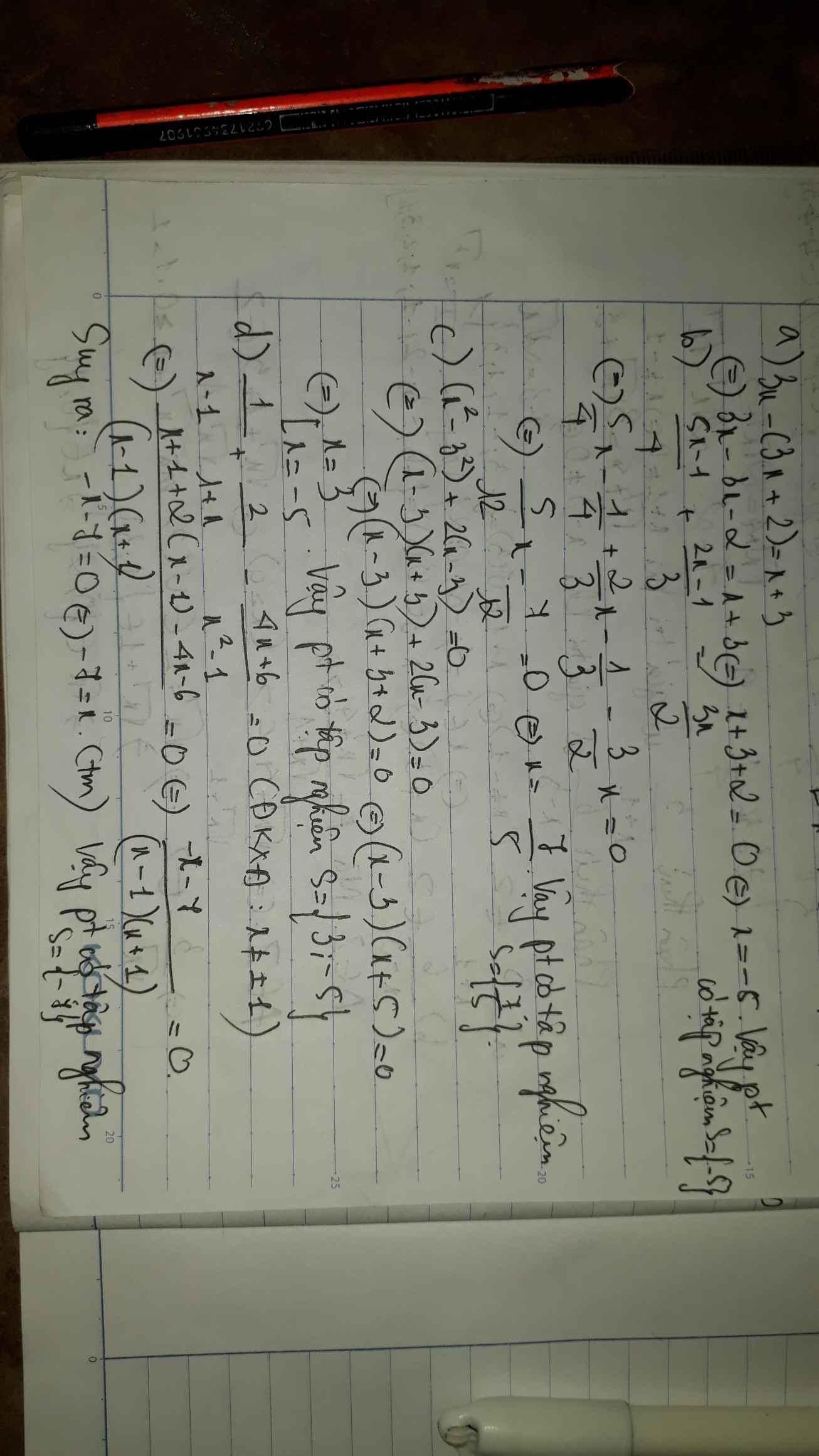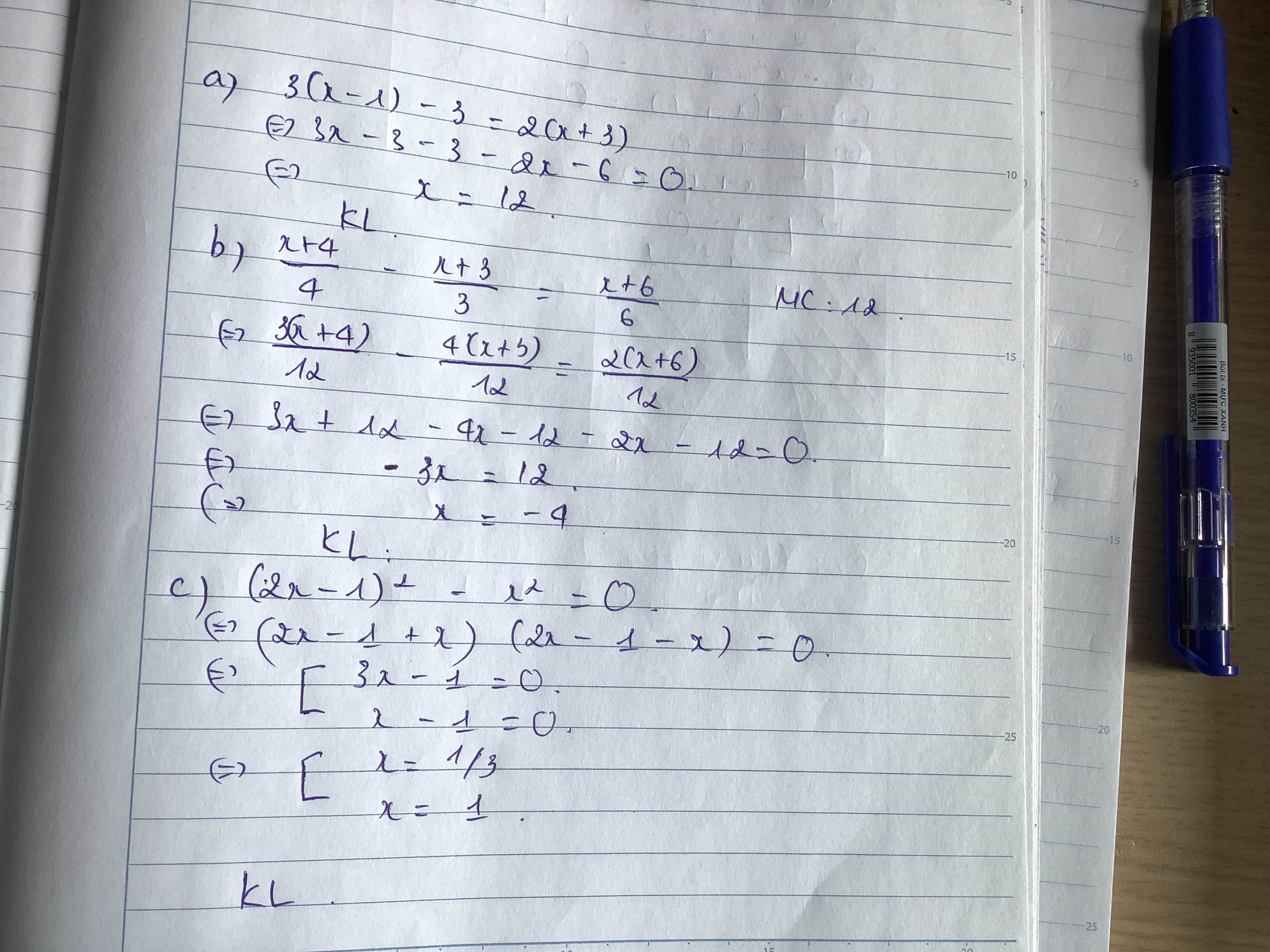Hãy nhập câu hỏi của bạn vào đây, nếu là tài khoản VIP, bạn sẽ được ưu tiên trả lời.

a: Ta có: \(3x-\left(3x+2\right)=x+3\)
\(\Leftrightarrow x+3=-2\)
hay x=-5
b: Ta có: \(\dfrac{5x-1}{4}+\dfrac{2x-1}{3}=\dfrac{3x}{2}\)
\(\Leftrightarrow15x-3+8x-4=18x\)
\(\Leftrightarrow5x=7\)
hay \(x=\dfrac{7}{5}\)

a: \(\Leftrightarrow20x^2-12x+15x+5< 10x\left(2x+1\right)-30\)
\(\Leftrightarrow20x^2+3x+5< 20x^2+10x-30\)
=>3x+5<10x-30
=>-7x<-35
hay x>5
b: \(\Leftrightarrow4\left(5x-20\right)-6\left(2x^2+x\right)>4x\left(1-3x\right)-15x\)
\(\Leftrightarrow20x-80-12x^2-6x>4x-12x^2-15x\)
=>14x-80>-11x
=>25x>80
hay x>16/5

Bài 3:
a) (3x - 2)(4x + 5)=0
\(\Leftrightarrow\left\{{}\begin{matrix}3x-2=0\\4x+5=0\end{matrix}\right.\)\(\Leftrightarrow\left\{{}\begin{matrix}x=\dfrac{2}{3}\\x=\dfrac{-5}{4}\end{matrix}\right.\)
vậy phương trình có tập ngiệm S={\(\dfrac{-5}{4};\dfrac{2}{3}\)}
b) 2x(x-3)-5(x-3)=0
\(\Leftrightarrow\left(x-3\right)\left(2x-5\right)=0\)
\(\Leftrightarrow\left\{{}\begin{matrix}x-3=0\\2x-5=0\end{matrix}\right.\)\(\Leftrightarrow\left\{{}\begin{matrix}x=3\\x=\dfrac{5}{2}\end{matrix}\right.\)
vậy phương trình có tập ngiệm S={\(3;\dfrac{5}{2}\)}
c) 2x(x + 3) + 5(x + 3)=0
\(\Leftrightarrow\left(x+3\right)\left(2x+5\right)=0\)
\(\Leftrightarrow\left\{{}\begin{matrix}x+3=0\\2x+5=0\end{matrix}\right.\)\(\Leftrightarrow\left\{{}\begin{matrix}x=-3\\x=\dfrac{-5}{2}\end{matrix}\right.\)
vậy phương trình có tập ngiệm S={\(-3;\dfrac{-5}{2}\)}

a) ( 4x - 1 ) (x - 3) - ( x - 3 ) ( 5x + 2 ) = 0
<=> (x - 3)(4x - 1 - 5x - 2) = 0
<=> (x - 3)(-x - 3) = 0
<=> x = 3 hoặc x = -3
b) ( x + 3 ) ( x - 5 ) + ( x + 3 ) ( 3x - 4) = 0
<=> (x + 3)(x - 5 + 3x - 4) = 0
<=> (x + 3)(4x - 9) = 0
<=> x = -3 hoặc x = 9/4
c) ( x + 6 ) ( 3x - 1 )+ x2 - 36 = 0
<=> 3x^2 + 17x - 6 + x^2 - 36 = 0
<=> 4x^2 + 17x - 42 = 0
<=> 4x^2 + 24x - 7x - 42 = 0
<=> 4x(x + 6) - 7(x + 6) = 0
<=> (4x - 7)(x + 6) = 0
<=> x = -6 hoặc x = 7/4
d) ( x + 4 ) ( 5x + 9 ) - x2 + 16 = 0
<=> 5x^2 + 29x + 36 - x^2 + 16 = 0
<=> 4x^2 + 29x + 52 = 0
<=> 4x^2 + 16x + 13x + 42 = 0
<=> 4x(x + 4) + 13(x + 4) = 0
<=> (4x + 13)(x + 4) = 0
<=> x = -13/4 và x = -4


Bài `1:`
`h)(3/4x-1)(5/3x+2)=0`
`=>[(3/4x-1=0),(5/3x+2=0):}=>[(x=4/3),(x=-6/5):}`
______________
Bài `2:`
`b)3x-15=2x(x-5)`
`<=>3(x-5)-2x(x-5)=0`
`<=>(x-5)(3-2x)=0<=>[(x=5),(x=3/2):}`
`d)x(x+6)-7x-42=0`
`<=>x(x+6)-7(x+6)=0`
`<=>(x+6)(x-7)=0<=>[(x=-6),(x=7):}`
`f)x^3-2x^2-(x-2)=0`
`<=>x^2(x-2)-(x-2)=0`
`<=>(x-2)(x^2-1)=0<=>[(x=2),(x^2=1<=>x=+-2):}`
`h)(3x-1)(6x+1)=(x+7)(3x-1)`
`<=>18x^2+3x-6x-1=3x^2-x+21x-7`
`<=>15x^2-23x+6=0<=>15x^2-5x-18x+6=0`
`<=>(3x-1)(5x-1)=0<=>[(x=1/3),(x=1/5):}`
`j)(2x-5)^2-(x+2)^2=0`
`<=>(2x-5-x-2)(2x-5+x+2)=0`
`<=>(x-7)(3x-3)=0<=>[(x=7),(x=1):}`
`w)x^2-x-12=0`
`<=>x^2-4x+3x-12=0`
`<=>(x-4)(x+3)=0<=>[(x=4),(x=-3):}`
`m)(1-x)(5x+3)=(3x-7)(x-1)`
`<=>(1-x)(5x+3)+(1-x)(3x-7)=0`
`<=>(1-x)(5x+3+3x-7)=0`
`<=>(1-x)(8x-4)=0<=>[(x=1),(x=1/2):}`
`p)(2x-1)^2-4=0`
`<=>(2x-1-2)(2x-1+2)=0`
`<=>(2x-3)(2x+1)=0<=>[(x=3/2),(x=-1/2):}`
`r)(2x-1)^2=49`
`<=>(2x-1-7)(2x-1+7)=0`
`<=>(2x-8)(2x+6)=0<=>[(x=4),(x=-3):}`
`t)(5x-3)^2-(4x-7)^2=0`
`<=>(5x-3-4x+7)(5x-3+4x-7)=0`
`<=>(x+4)(9x-10)=0<=>[(x=-4),(x=10/9):}`
`u)x^2-10x+16=0`
`<=>x^2-8x-2x+16=0`
`<=>(x-2)(x-8)=0<=>[(x=2),(x=8):}`

a: =>5-x+6=12-8x
=>-x+11=12-8x
=>7x=1
hay x=1/7
b: \(\dfrac{3x+2}{2}-\dfrac{3x+1}{6}=2x+\dfrac{5}{3}\)
\(\Leftrightarrow9x+6-3x-1=12x+10\)
=>12x+10=6x+5
=>6x=-5
hay x=-5/6
d: =>(x-2)(x-3)=0
=>x=2 hoặc x=3

d: Ta có: \(\dfrac{x}{x+3}-\dfrac{2x}{x-3}-\dfrac{3x}{9-x^2}=0\)
\(\Leftrightarrow x^2-3x-2x^2-6x+3x=0\)
\(\Leftrightarrow-x^2-6x=0\)
\(\Leftrightarrow-x\left(x+6\right)=0\)
\(\Leftrightarrow\left[{}\begin{matrix}x=0\left(nhận\right)\\x=-6\left(nhận\right)\end{matrix}\right.\)


a) \(5x - 30 = 0\)
\(5x = 0 + 30\)
\(5x = 30\)
\(x = 30:5\)
\(x = 6\)
Vậy phương trình có nghiệm \(x = 6\).
b) \(4 - 3x = 11\)
\( - 3x = 11 - 4\)
\( - 3x = 7\)
\(x = \left( { 7} \right):\left( { - 3} \right)\)
\(x = \dfrac{-7}{3}\)
Vậy phương trình có nghiệm \(x = \dfrac{7}{3}\).
c) \(3x + x + 20 = 0\)
\(4x + 20 = 0\)
\(4x = 0 - 20\)
\(4x = - 20\)
\(x = \left( { - 20} \right):4\)
\(x = - 5\)
Vậy phương trình có nghiệm \(x = - 5\).
d) \(\dfrac{1}{3}x + \dfrac{1}{2} = x + 2\)
\(\dfrac{1}{3}x - x = 2 - \dfrac{1}{2}\)
\(\dfrac{{ - 2}}{3}x = \dfrac{3}{2}\)
\(x = \dfrac{3}{2}:\left( {\dfrac{{ - 2}}{3}} \right)\)
\(x = \dfrac{{ - 9}}{4}\)
Vậy phương trình có nghiệm \(x = \dfrac{{ - 9}}{4}\).
xem lại câu b nha, tại vì trên là 7 dưới -7